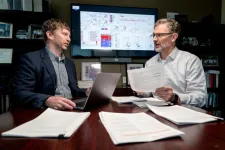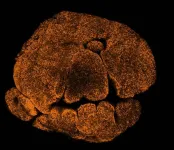(Press-News.org) Babies recognise pretence and around half of children can pretend themselves by 12 months, new research has found.
The study, led by the University of Bristol, shows for the first time how children’s awareness and grasp of pretence in its various forms develops from birth to three years.
Lead author Prof Elena Hoicka, Professor of Psychology in Education at the University’s School of Education, said: “Our findings highlight how pretending is a complex, evolving process which begins very early on in life, helping their cognitive and social skills to advance. Pretence is a key part of children’s learning, creativity, making friends, and understanding of other people. This study maps its many different stages and types.”
The findings are based on results from a survey of 900 parents of children aged from birth up to three-years-old (47 months) from the UK, US, Australia, and Canada. The earliest reported age when children understand pretending was four months and by the age of 13 months around half were reported to recognise pretence by others. Around half of 12-month-olds were reported to be pretending regularly themselves.
Researchers identified 18 different types of pretending which emerge and progress in the early years. One-year-olds’ pretence was shown to initially involve their bodies, for example pretending to sleep. They may also gesture objects and actions, such as brushing their teeth with a finger or pretending with objects for their intended purpose like drinking out of an empty cup.
Prof Hoicka added: “This then moves on to pretending one object is another, for instance pretending a banana is a phone. This type of pretending really opens up their sense of creative play as they can now imagine any object they want to play with.”
The pretence of two-year-olds’ was reported to show more abstract thought, with children pretending to do things they wouldn’t normally have everyday experience with, like pretending to fly a rocket ship. By this age children use their whole bodies to pretend to be others, including being objects such as a tree, animals, or other people.
“This can include people they know and fantasy characters, such as Spider-Man or Peppa Pig. As their language skills are also developing, this can help them to pretend in new ways, allowing them to create elaborate storylines when doing so,” Prof Hoicka added.
Finally, three-year-olds were reported to be highly creative, often inventing wild scenarios, such as impersonating cartoon characters flying through space. Some were also said to be creating and interacting with imaginary friends.
Prof Hoicka said: “While some parents may be over-reporting pretence understanding in the youngest children – at four months – in our sample, the ages at which parents observe these 18 pretence types are largely consistent with previous research findings.”
The study is the first of its kind to chart how and when pretence evolves from its inception through three years.
“Previous early pretence studies have been observational or experimental, limiting the number of children involved,” Prof Hoicka added. “This new parent-report survey measure has allowed researchers to study a large number of children, which is unheard of using observational or experimental means.”
The researchers hope it will help parents and early years teachers understand and identify which types of pretence are appropriate to try with children at certain ages, supporting their learning, creativity, and friendships.
Prof Hoicka said: “With further research, the findings have the potential to be used as a diagnostic tool for developmental differences in early years. This could ultimately help parents, early years educators, and medical professionals better understand how to play with children at different stages of development.”
END
Pioneering research sheds light on how babies and young children understand the art of pretence
2024-08-15
ELSE PRESS RELEASES FROM THIS DATE:
Climate reporting standards insufficient, must be expanded, say Oxford net zero experts
2024-08-15
A new paper from the Smith School of Enterprise and the Environment, University of Oxford concludes that current climate standards are not sufficiently incentivising the big picture innovations necessary to deliver net zero, and must be expanded to include a company’s broader influence on climate action. The peer-reviewed research, published in Carbon Management, comes after a period of fierce public debate about climate standards and offers possible solutions for those seeking to improve both integrity and impact of corporate climate action.
Incentivising climate action and innovation in the corporate world is essential says co-author Dr Matilda Becker: “Of the 2000 largest ...
Khojandi, Zhao selected for prestigious AAAS STPF fellowships
2024-08-15
Anahita Khojandi and Xiaopeng Zhao have been selected by the American Association for the Advancement of Science (AAAS) to participate in the 2024-25 Science & Technology Policy Fellowship (STPF).
Khojandi, a Heath Endowed Faculty Fellow in Business & Engineering and Associate Professor in the Department of Industrial and Systems Engineering, and Zhao, a professor in the Department of Mechanical, Aerospace, and Biomedical Engineering and founding director of the Applied AI Program ...
Singing from memory unlocks a surprisingly common musical superpower
2024-08-15
New research from UC Santa Cruz is finally giving you the go-ahead to sing in the shower as loud as you want. Because, as it turns out, you probably sound pretty darn good.
Psychologists wanted to study “earworms,” the types of songs that get stuck in your head and play automatically on a loop. So they asked people to sing out any earworms they were experiencing and record them on their phones when prompted at random times throughout the day. When researchers analyzed the recordings, they found that a remarkable proportion of them perfectly matched the pitch of the original songs they were based upon.
More specifically, 44.7% of recordings had a pitch error of 0 semitones, ...
A call to bridge the cancer care – chronic illness management gap
2024-08-14
Providing cancer care for someone who also has a chronic illness, such as diabetes or high blood pressure, requires a systematic, co-management approach to produce better cancer and overall health outcomes, said UNC Lineberger Comprehensive Cancer Center’s Samuel Cykert, MD.
Cancer patients with a chronic illness often experience poorer outcomes. This is especially true for Black patients. Contributing to this disparity, studies show, is the increased likelihood that people with chronic illnesses may not be offered standard cancer treatments like surgery, chemotherapy or radiation. If they do start standard treatment, they might not complete it due to complications from ...
The American Ornithological Society (AOS) announces its 2024 award winners for achievements in ornithological research, service, conservation, and publication
2024-08-14
CHICAGO—August 14, 2024—Each year, the American Ornithological Society (AOS) confers awards on individuals and groups for their ornithological research and notable contributions to the science and practice of ornithology, and for their service to the society. Our 2024 awardees represent outstanding contributions to the scientific study and conservation of birds and to the AOS. The 2024 recipients will accept their awards at the AOS annual meeting (AOS 2024) in Estes Park, Colorado, in October.
“Our award winners this year epitomize the excellence in research, publications, service, and conservation in ornithology towards which we all strive in our profession,” ...
New research from Children’s Hospital of Philadelphia and St. Jude poised to transform approach to diagnosing and treating acute leukemia in children
2024-08-14
Researchers at Children’s Hospital of Philadelphia (CHOP), St. Jude Children’s Research Hospital (St. Jude) and the Children’s Oncology Group (COG) today announced a significant paradigm shift in the understanding of T-lineage acute lymphoblastic leukemia (T-ALL), an aggressive and high-risk form of cancer, to one frequently driven by genetic changes in non-coding portions of our DNA. The collaborative study, supported by the Gabriella Miller Kids First Pediatric Research Program (Kids First) and National Institutes of Health (NIH) Common Fund, was published ...
New clue into the curious case of our ageing immune system
2024-08-14
A WEHI study could help solve a long-standing mystery into why a key immune organ in our bodies shrinks and loses its function as we get older.
The thymus is an organ essential for good health due to its ability to produce special immune cells that are responsible for fighting infections and cancer.
In a world-first, researchers have uncovered new cells that drive this ageing process in the thymus – significant findings that could unlock a way to restore function in the thymus and prevent our immunity from waning as we age.
Watch and embed the video: https://youtu.be/2x1UGqNh77w
At a glance
The thymus is an organ essential for our immune defence ...
Venting your frustrations can make friends like you better – if you do it right
2024-08-14
Key takeaways
Venting about your frustrations with one friend to another may feel good, but it doesn’t necessarily reduce anger.
Experiments showed that people who listened to a friend vent liked and supported that person more than those who were vented about — but only if the person venting didn’t derogate or seem aggressive toward the other friend.
Venting might be an effective tool of competition for listeners’ affections precisely because it is not readily recognized as a tool of competition.
Venting about your frustrations with one friend to another isn’t necessarily cathartic, but it can make the friend you’re talking to like and ...
Phase 1 BAFF CAR T clinical trial for patients with relapsed and refractory multiple myeloma underway at UH Seidman Cancer Center
2024-08-14
CLEVELAND – University Hospitals (UH) Seidman Cancer Center hematologist-oncologist Leland Metheny, MD, is leading the trial. He says in the two years since the foundational pre-clinical work was completed, the team has shown that it’s feasible to manufacture BAFF CAR T-cells for human subjects. The innovation is introducing genes into T-cells via the process of electroporation in the Wesley Center for Immunotherapy at UH Seidman Cancer Center.
In January 2022, a research team from UH Seidman Cancer Center and Case Western Reserve University published a groundbreaking ...
Microscopic packets could deliver diabetes-preventing therapeutics
2024-08-14
Within each of us lies an army of cells whose topmost duty is protecting against external pathogens and internal threats such as proliferating cancer cells. Yet, immune cells can sometimes erroneously attack the body, causing autoimmune diseases like type 1 diabetes.
Texas A&M researchers recently received an RO1 grant from the National Institutes of Health to develop a strategy to deliver immune-suppressing proteins generally produced by specialized stem cells. Such an approach could potentially help reduce the immune system's attack on the insulin-producing beta-cells in the pancreas and open doors to a novel treatment for type 1 diabetes.
"We are excited that the ...


